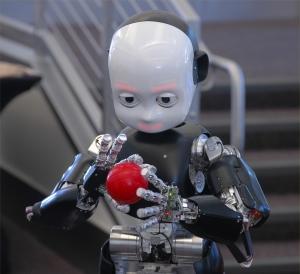iCub Takes Humanoid Robotics Back to Its Infancy

Share

iCub is learning like a toddler.
When parents give birth to a child, it would seem pretty ridiculous to expect that baby to immediately live and function as well as an adult. Yet our pursuit of humanoid robots does almost exactly that. We create automatons and try to train them to play and work like adults. As recently featured in Nature, the RobotCub project is rethinking that approach with iCub, a robot toddler. Funded by the European Commission and spread out over universities the world over, RobotCub is aiming to create the first robot that learns and develops like a three and a half year old child. Check out the videos after the break that demonstrate how iCub interacts with and learns from his environment.
Our brains are amazingly complex machines. We've shown you how Henry Markram and the Blue Brain Project hope just to effectively model one over the next ten years. The RobotCub project is starting on a much simpler task: making iCub learn the way an infant or toddler would. When iCub is introduced to something important, it will follow the object with its eyes/cameras. When it has arms, iCub reaches to interact with those same important objects. It's a kinetic/tactile and generally sensory-based learning approach that has been tested for thousands of years in humans. If it succeeds, RobotCub may not only help a robot reach adolescence, it could pave the way to humanoid robots that can learn to truly think and act like humans.
Be Part of the Future
Sign up to receive top stories about groundbreaking technologies and visionary thinkers from SingularityHub.


Watching these videos, you have to keep in mind the approach behind the demonstrations. Creating a robot that tracks objects is easy. Having a robot grab a ball is also pretty simple. iCub, however, is developing the methods to perform these tasks as part of a larger goal. Toddlers learn language by interacting with their environment, naming things, and then constructing basic phrases under the guidance of adults. iCub is following the same path: look, interact, name, speak. iCub's parents (the roboticists) help by showing which objects are important, giving names, and (eventually) correcting grammar. In theory, this style of positive feedback loop will allow iCub's future videos to demonstrate a basic grasp of language.
It's just a prejudice of mine, but I'm always more inclined to trust and praise a project that is open source. RobotCub is trying to be as open a project as the necessary technology and expertise allow. Already iCub siblings were sent to six universities free of charge as part of an open call for project ideas. In general the platform is planned to be distributed openly. The software is open source, and the project has a healthy wiki. There's even a summer school for robotics students.
Like iCub, the RobotCub project is still in its early stages, so it's hard to know if it will succeed the way that it hopes. Certainly learning machines are going to be a powerful new technology in the years to come, and I can see toddler robots as a popular meme for the next generation of humans. Speilberg's AI suggested as much. What remains to be seen is if the human brain's approach to learning and to language are unique, or if they can be simulated using computers and humanoid robots. iCub could be the real-life equivalent of Astro Boy. Too cool.
[photo credits: RobotCub Project]
Related Articles

What the Rise of AI Scientists May Mean for Human Research

This ‘Machine Eye’ Could Give Robots Superhuman Reflexes

Scientists Want to Give ChatGPT an Inner Monologue to Improve Its ‘Thinking’
What we’re reading